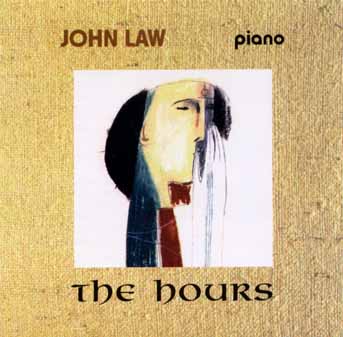


"The third and final album in a series of piano meditations sparked off by John Law's interest in early monastic music. The Hours takes material from the Liber Usualis as its starting point.
After briefly stating each of the eight plainchant "themes", Law subjects them to sometimes surprisingly robust but consistently graceful and mellifluous treatments, imbued with the disciplined vigour that is the most obvious legacy of his immersion over the past few years in free jazz.
Added to his recent acclaimed trio of albums of Thelonious Monk interpretations and idiosyncratic visits to standards, Law's three solo piano plainchant albums confirm his reputation as one of this country's most imaginative young pianists."

Chris Parker The Times September 1997

If you've heard only John Law's trio and quartet discs, The Hours may surprise you. It's the final disc of a three-CD set (all released on FMR) in which he conjures improvisations out of plainchant. Each of the discs - recorded over a period of four years - stands alone, but they refer to each other far more than to his group music.
Law has taken the canonical hours observed by Benedictine monks as an inspirational source. The musical source is the Liber Usualis, from which fragments of chant have been extracted. The first eight tracks on the disc provide a brief exposition of the chants, of which only Salve Regina lasts more than one minute. During the remaining fifty-one minutes he fleshes out these skeletal forms. Each piece is structurally pre-conceived, though freely improvised.
Law is a player for whom momentum and lightening shifts of emphasis and pace often seem to take precedence over harmonic development, so working with the homespun melodies and plodding 'free' rhythm of plainchant is quite a challenge. In Matins/Vigiliae, for xample, because he holds to the breath-length phrases of the chant, he's obliged to augment the melodic line with short quasi-contrapuntal passages and delicately spun harmonic embellishments. It's not a problem - he isn't hampered in the least by these formal constraints; every note he plays is imaginatively chosen and sounds absolutely right.
Things loosen up almost immediately, however. Breath-length phrases are still in evidence during Lauds, but his ambitious melodic ideas are supported by an ostinato pattern which operates like the tambura in Indian classical music: less an harmonic cushion, more a demarcation of compositional/improvisational space.
Something unusual happens at the beginning of Terce, too. He plays permutations of the chant fragment - a series of nine- and ten-note phrases - straight, without embellishment, but he strikes each note rapidly three or four times. I've never heard a pianist do this before. Also, something has been placed on the piano strings to delicately colour the sound; the notes ring true but with a chiming, shimmering quality. This gives the piano the texture and resonance of a santoor (if you've heard Shivkumar Sharma play, you'll know what I mean). And when a six-note sequence in Vespers gets a slightly similar treatment (minus the preparations), jagged bluesy phrases emerge - and sound just as exotic.
The moods he creates are often pensive but not solemn. There's an unfettered liveliness to much of this music: the elaboration the chant in Nones is underpinned by an infectiously jaunty rhythm, and the middle section of Vespers dances and swirls. In pieces such as Sext and Vespers, his excursions are rhythmically and melodically free, and for long periods the chant is far from evident. But it's always there, like an underground stream which surfaces in unexpected places. With Compline, a tender ballad, Law returns wholeheartedly to the chant; he treats its rhythmic and melodic contours with respect, while making something new and utterly magical of it.
In a word, remarkable!

Brian Marley Avant Magazine Autumn 1997